Parachutes | EP | Brothers & Sisters | EP | Blue Room
Parachutes
With the release of their debut long player Parachutes, Coldplay look set to earn themselves a place among the pantheon of big name UK bands. The English group's first three EPs were 1998's Safety, and 1999's Brothers and Sisters and The Blue Room with the band's delicate and intricately arranged rock leading to very understandable comparisons with Radiohead.
A sensational performance on the new bands stage at Glastonbury in 1999 led to the band being invited back for 2000, where it was generally agreed they stole the show. There have been suggestions that, as a result Coldplay will follow Travis's international success.
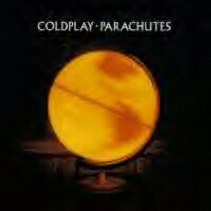
"Shiver", the first single released from the album Parachutes, was a UK Top 40 hit in February, and the second single, "Yellow", debuted at number four in England. Alternating between a driving electric guitar part and Chris Martin's delicate vocal line, "Yellow" owes a lot to the Radiohead school of songwriting, without seeming like a blatant rip-off.
Lyrically, "Yellow" provides a wide-eyed and innocent perspective on love ("I took my time, what a thing to do"), and consequently sounds refreshingly simple and relaxed.
The style set by "Yellow" holds true for the entire album. The opener "Don't Panic" shows a rougher, lower side to Martin's voice through the verses against a high chorus which proclaims very simply and believably that "we live in a beautiful world."
The title track is a folk number that rolls around for 45 seconds and then vanishes. It serves as a nice introduction to the difficult mood of "High Speed", a tune which pushes the concept of ambient rock to the limits.The high point is the closing track, "Everything's Not Lost", that grows from a vocal and piano introduction into an epic ballad.
Parachutes delivers an atmosphere of delicate control, drawing on the brilliant production of Ken Nelson (Gomez, Badly Drawn Boy) to create an inspiring debut.
Three singles were released from Parachutes, the debut album - Shiver, Trouble and Yellow. Hear the lyrics to the album. The album 'Parachutes' has not been released in China because of its inflammatory political content - the track 'Spies' being the main culprit!
The globe on the front follows the band onstage at each gig. This album was toured for over a year, with 4 United Kingdom tours being completed before the album was even on the shelves. Check out the following reviews below:
But, hang on. Weren't Oasis everything we could want from a rock band once?
They fought, had rock star girlfriends, slagged people off and wanted loads of cash to blow on stupid houses. Fine, but those are exactly the things that have made them an embarrassment; an endless, dull cocaine comedown. Remember the disappointment you felt after 'Be Here Now'? Coldplay will never let you down like that.
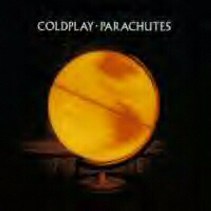
Like Travis before them, Coldplay care about what really counts. 'Parachutes' is all that matters in the world to singer Chris Martin. It only takes one listen to realise how he has poured every thought, every feeling he's had in the last two years into this record. With the focus so much on Chris' voice here, it's like reading one long, intimate love letter.
Indeed, for all Chris' perceived mildness, there's nothing half-hearted about some moments here, moments which indicate there's more to him than anyone knows. For a man in his early 20s, the mind boggles over the tragic air of his love life; the number of feelings gone unrequited, the number of loves pined for. The band's biggest hit so far, 'Shiver', is a heart-rending case in point, its first line saying it all ("So I look in your direction, but you pay me no attention"). It's powerful because its sentiment is so simple. And, let's face it, so easy for everyone to comprehend.
Again, in the devotional 'Yellow' ("For you, I bleed myself dry", no less) or the gorgeous regret of 'Trouble' ("I never meant to do you harm"), it's the force of feeling which counts. That's what brings the entirely favourable comparisons to Jeff Buckley, The Verve, even Radiohead. But it's far gentler than anything the latter have ever done. Unlike Thom Yorke, Chris exists in a place we can almost understand. A place that Fran Healy might have passed through, but is too happy with his girlfriend to really remember.
All told, it's incredible this is a debut album. Accomplished, yet subtle, it works perfectly as a whole in a way all the production skills in the world couldn't replicate. Forget trashing rooms and rent-a-quotes, just listen. This really is all that matters. "
Let it be that simple for once. 9/10
Just imagine the fuss if somebody truly amazing came along. Us critics would have to drag ourselves out from up Thom Yorke's arse and quickly concoct a whole new raft of superlatives to replace all those old ones we've so glibly frittered away on the nice-but-ordinary likes of Coldplay.
Parachutes, Album of the Year, apparently, but ten years ago this bunch would have been happy scoring a perfunctory 30-second glimpse of their grubby new video on The Chart Show's Indie rundown. Nowadays they go straight in at No.4 on the proper, grown-up Top 40 and find themselves feted as the next big thing. 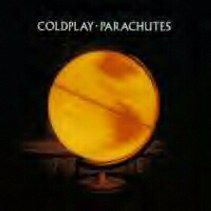

True 'Yellow' is a cut above virtually everything else out there at the moment but please bear in mind that these are dark, doleful times we currently endure. Like the rest of 'Parachutes' though, it's initial doe-eyed cuteness all to quickly starts to cloy. As a conceit it's fairly affecting but a conceit it remains all the same. You can't help but dwell on the fact also that 'yellow' too readily calls to mind the sour hue of stained y-fronts. Oh yeah and it's a third-rate rip-off of The Boo Radley's mighty 'Lazarus' into the bargain. There, that should have killed the magic for you.
Widely regarded as the next Travis, on this evidence Coldplay are more redolent of Embrace's early way with a tune. What they lack though, particularly on the quirky waltz-time fade-out of last track 'Everything's Not Lost', is Embrace's who-you-looking-at swagger. 'Parachutes' is just all so very, very polite and unassuming; 'We Never Change' might bravely plonk itself down at the old pianna in-between Tom Waits and Randy Newman but it too quickly realises that it really hasn't got a great deal to say for itself.
Album of the Year then but only for those poor battered souls who've just discovered the warm hug of well-spoken melancholy. It can't do any harm either that they were all probably too interested in Buzz Lightyear at the time to be aware of 'The Bends' when it came out.
Jackie Flynn
Hovering around the bottom of a list of what the world needs right now must surely be: more whey-faced introspective guitar bands. At fist glance, the evidence is not good: Coldplay are four sensitive souls - higher education and pot noodle diets not too distant a memory - and clearly au-fait with the finer points of Jeff Buckley, Pink Floyd and, inevitably, Radiohead. So far, so Muse.

Yet their debut album's secret arsenal comprises frontman Chris Martin's voice - prematuraly aged for someone in their early twenties - and some supple, persuasive melodies.
That and a great big side order of melancholy. Don't Panic, Sparks, and the singles Shiver and Yellow have a spidery quality with Martin's admittedly Jeff Buckley-esque voice assured and agile, but never performing gymnastics just for the hell of it. Spies is goosepimply, 4am stuff, with a forboding acoustic guitar refrain, matched later by Trouble's desolate piano hook.
You can only wonder what well of emotional trauma has been dredged for some of what's on offer here. Though Everything's Not Lost and the "hidden" track, Life's for Living have an uplifting quality, suggesting that it all might come right in the end. Halls of residence will echo with this record for months to come, but the rest of the world could do worse than listen.
4/5
Mark Blake
In a year in which the defining trends have been the unstoppable rise of Travis and the New Miserablists (Doves, Muse, and so on), Coldplay are very much a band of their time. In the two years since their inception, they, like Travis, have constructed an anti-image of bruised vulnerablity and machismo-free bonhomie. In singer Chris Martin, they also possess a songwriter who tends towards the melancholic (the opening song here contains the line "All of us are done for"). The only difference is that where Travis took a whole album to arrive at The Man Who, Coldplay have done it straight away.
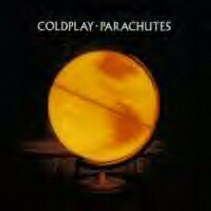
Parachutes is a sensational opening gambit and one that more than justifies the plaudits heaped upon them by the weekly music press (they've already had one NME cover). Although Jeff Buckley and Radiohead are the names normally bandied aroubd when discussing them, a more telling reference point, certainly in terms of background and sensibility, might be Nick Drake. Parachutes - where virtually every track is a doomed love-letter to persons unknown - has the same enveloping warmth and brittle emotion.
There's also a sense of familiarity here that eases you in. The spine of this record is comprised of their three Parlophone singles to date - the spectacular emotional flare-ups of "Shiver" and "Yellow", as well as two tracks from their debut Blue Room EP. The fact that these are augmented by at least two tracks ("Trouble" and "Everything's Not Lost") that equal, if not surpass, them in terms of melody and naked intimacy adds to the feeling that here is a very special record indeed.
If many debut albums are capsized by clamorous expectations, Coldplay's gradual ascent has meant they've reached their first summit with oxygen to spare. Parachutes is a wonderful record. Coldplay might be a band of their time, but what they've achieved here goes far beyond that.
4/5
James Oldham
(CNN) -- There should always be a band like Coldplay.
You know the type: a band that isn't trying to be trend-setting, yet sounds fresh; that is reminiscent of many things, while not blatantly imitating any one group; a band that isn't afraid to be big and simple, melodic and elegant.
The pop-music landscape is littered with bands that tried to occupy such an artistic niche, but fell short. Coldplay, a London-based quartet, finds that enviable spot and refuses to vacate it throughout "Parachutes," its American Debut.

The band -- singer/pianist/guitarist Chris Martin, bassist Guy Berryman, guitarist Jonny Buckland and drummer Will Champion -- push and pull between the aural atmospherics of Radiohead ("Spies"), the pop accessibility of Duncan Sheik ("High Speed"), the vocal range and stylings of Jeff Buckley ("Shiver") and even the slightly off-kilter pop approach of Australian Ben Lee ("Don't Panic").
While Martin's vocals shift effortlessly between melodics and emotional falsetto, Buckland, Berryman and Champion offer an intricate and unobtrusive ambience.
Martin turns to upbeat and positive ideas that never broach the saccharine. "We live in a beautiful world," he sings during the chorus of "Don't Panic," the album's opening tune; he manages to make those words sound more reassuring than PoPollyannaishAnd when he sings, "Look at the stars/Look how they shine for you," in "Yellow," Martin makes it sound like one of the most simple love notes imaginable.
"Yellow" made the band a household name in the United Kingdom and is their lead single here. If the song survives pop culture's recent bout of attention deficit disorder, it has the ability to become the high school love song of next summer.
That's not to say "Parachutes" is merely a juvenile spin. Indeed, as pop-laced as the songs sound, there is a subtle jazz element to Berryman's bass playing and Champion's drum works. Perhaps that's what makes Coldplay a bit more interesting than any of their Brit-pop predecessors. Or maybe it's just because the band doesn't seem to try to emote beyond its experience.
What Coldplay and the gargantuan popularity of bands like Travis and Radiohead prove is that the mid-'90s Cool Britannia has rusted — not coincidentally at the same moment that Britain's love affair with New Labour and Tony Blair has begun to dim and sour. The rising political disillusionment and apathy is matched by a growing moodiness in British pop. Musical anthems (Travis' "Why Does It Always Rain on Me?" and "Driftwood" and Coldplay's "Yellow") are less cheery barnstormers and more complex introspection, and if not exactly downcast, then certainly tinged with melancholy not unlike the ending days of a tempestuous relationship. 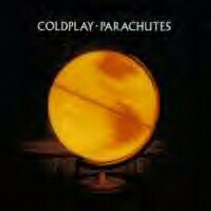

If Travis was "the" British band of the summer of 1999, then Coldplay is surely fulfilling a similar role in the first year of the new millennium. And what both bands demonstrate is that Radiohead is the new creative standard-bearer in British pop, having inherited that mantle from Oasis sometime around the release of 1997's OK Computer and the decidedly underwhelming '97 Oasis offering Be Here Now.
But don't be fooled by naysayers like McGee into thinking that Coldplay is merely Radiohead Junior or Jeff Buckley lite. These early twentysomethings have come crashing out of the gate with an album, Parachutes, more developed and fully artistically realized than what Radiohead managed to achieve at a similar stage in their career.
"Yellow" is the song everyone's talking about. It has Wembley Stadium anthem written all over it — from the chugging guitar intro to the wistful acoustic verse. As a paean to heart-wrenching love, it fires on all cylinders and reminds us of just how all consuming that first love is. Frontman Chris Martin certainly hasn't forgotten, imploring that "for you, I'd bleed myself dry." The propulsive rhythm guitars only make those emotions even more palpable.
Interestingly, Coldplay prove to be near Radiohead's equal at employing compelling stop-start dynamics and beautifully building crescendos on this track, as well as throughout Parachutes. "Shiver" is the probably the most apt comparison between these two bands, as the song alternates between a blistering guitar attack on the chorus and a quieter tender mood on the verse. Martin is also near Thom Yorke's equal in the vocals department, fully capable of both a sweet falsetto and rousing full-throated singing of enough power to get the punters' lighters lifted and lit, arms in the air at stadiums across Britain.
Enough of the Radiohead comparisons. I don't want to be the latest in the line of lazy journalists to burden a band this talented with that label. I merely suggest that Coldplay have released the monster debut of the year and fully belong in the company of bands as brilliant as Radiohead and Travis and that Britain's post-Britpop hangover is at least as musically compelling, if not more so, than the rah-rah days of Cool Britannia culture.
Welcome! | Latest News | About | Mailing List | Sign Guestbook | Read Guestbook | Contact Us | Index
|